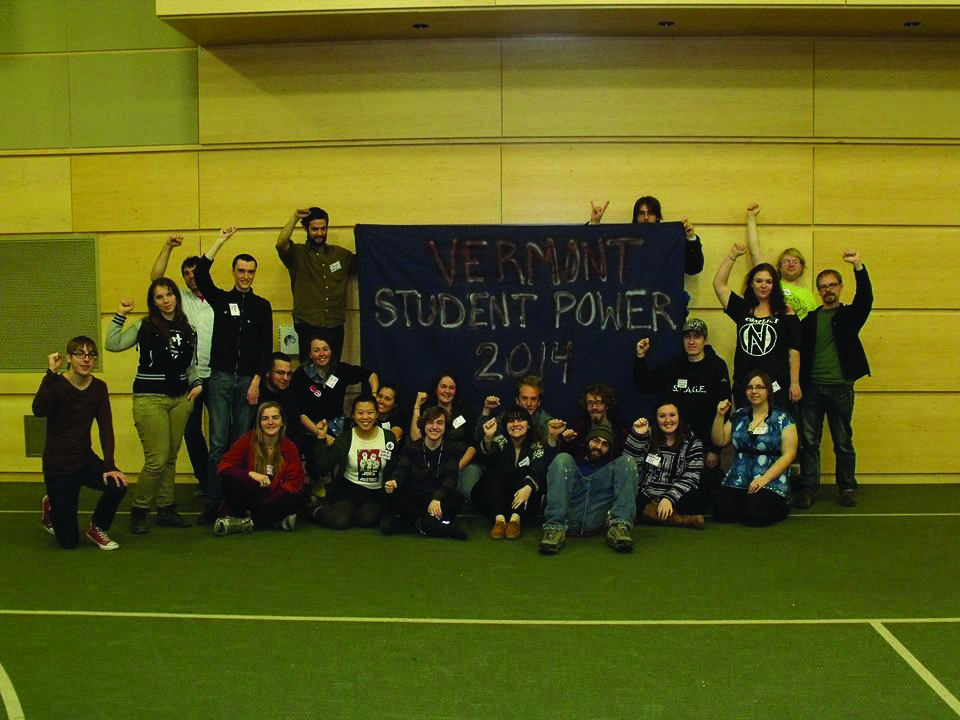Vermont Student Union formed to address higher ed issues
Students from across Vermont gathered in Randolph for a day of activism workshops
College students from across Vermont, as well as union representatives and concerned citizens, took a step forward towards creating an organization focusing on higher education issues inVermont on Friday, Feb. 7.
The 27 people, 20 of them students, met at the Vermont Technical College campus in Randolph for an event titled: The Vermont Student Power Conference.
Among the changes the organization advanced was changing the name from the Vermont Student Organizing Project to its new official name: The Vermont Student Union.
Students represented Castleton, UVM, Burlington College, Lyndon, and Johnson, with seven students being led by organizer Liz Beatty-Owens. Also at the conference were members of the Vermont State Employees Association, American Federation of Teachers Vermont, Vermont Workers Center, and a member of a student solidarity organization in Quebec.
Owens, who is a senior at Johnson State College, said that through Ben Johnson from AFT, a collective student organization was created to represent students from across the state.
Owens is one of three interns from Castleton, Lyndon, and Johnson who helped organize the conference to attract students from across the state. “There’s really a lot of power in all of us getting together on a regular basis and educating one another,” Owens said.
He said some of the main goals are making sure students are able to know where their money is going and trying to get S.40 passed, a bill that would begin the process of the state going back to its promise to substantially cover the cost of Vermont State Colleges. “Important to me is that we empower students to speak up for themselves and get involved in local government,” he said. “Because throughout history student movements have been what changed so many social justice issues.”
On the agenda for the conference were choices of four different workshops on solidarity building, movement building, organizing conversations, and creating our own media. Each of these was made to help students on their involvement within the VSU.
During the opening ceremony a member from UVM said there is a crisis in higher education due to it being run like a corporation. He also said Vermont is the second least funded state for higher education after New Hampshire.
Owens said Johnson has weekly meetings in its chapter and how this organization will be set up to build solidarity with all students in Vermont. Through the VSU, he said, students will be able to have a voice in how higher education is run.
Many of the organizations at the conference said that Vermont workers and students shared the same problem, since students are working to produce intellectual material.
At the movement building workshop students met to learn how to empower the movement of students pushing to end the enormous amount of debt that they pay to attend college.
Students learned that the root of movement building is in education and explaining the issue to people, but what’s also necessary is the direction and conscious effort within the organization.
Ways that the VSU has done this already is through creating postcards and taking pictures of students holding signs showing how much debt they will be in once they graduate college and how a lot of them will be unable to afford to live in Vermont after they graduate because of this.
Ryan Downs, a Johnson senior who attended the conference, said that one of the main reasons he went was the debt he’s accumulated as an out-of- state student. “I’m definitely going to be a lot in debt when I graduate,” Downs said. “And I don’t really know what I’m going to do about it.”
Downs also said he went to help change the system that is contributing to the heavy debt students have after college and the difficulty in finding jobs after graduation. “It doesn’t end when students graduate,” Downs said. “If anything it just starts. This is something that 20-30 years down the road students will still be paying off their loans.”
Other workshops included one on solidarity, which pushed for students, workers, and community members to work together to solve the issues facing their communities.
It also included information on how the VSU is supporting other organizations and building strength through this process.
In a panel, members discussed what the VSU needs to have to be considered seriously.
This would include a general assembly, the ability to vote on issues including strikes, connections to a larger organization, and the ability to inspire people to join the union.
Most importantly, however, is the ability to convince students that they matter and that they have power.
In addition to changing the name, members of the VSU discussed its goals and values, the process of choosing delegates to meet to connect the colleges, and a list of priorities.
The VSU in closing agreed to have two delegates elected from each chapter to meet in Montpelier Feb. 21 to relate the issues brought up in each chapter meeting.
Ben Simone joined the Basement Medicine Staff in Spring 2014, assuming the position of staff reporter.




